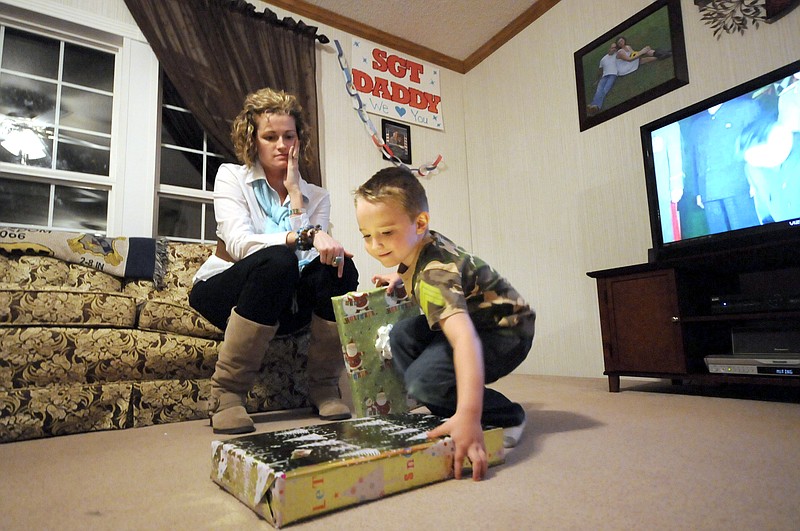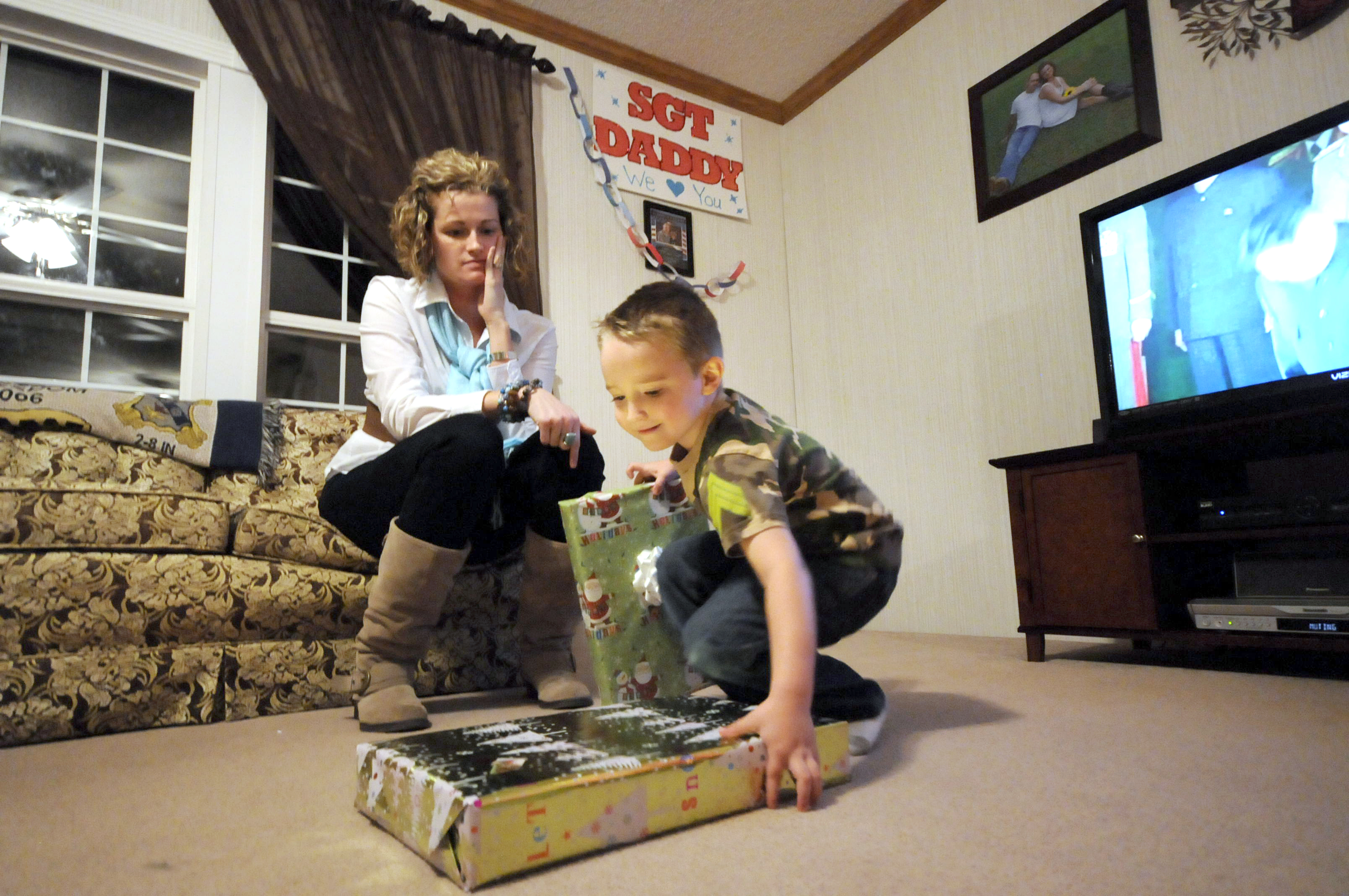BY THE NUMBERS36: Tennessee Army National Guard units deployed to support Operation Iraqi Freedom97: Tennesseans killed; 598 wounded141: Georgians killed; 862 wounded73: Alabamians killed; 550 wounded4,484: U.S. troops killed during Iraq War30,108: Total U.S. wounded during Iraq WarSource: State, federal governmentsIRAQ CASUALTIESThe most deadly year of the war was 2007, with 904 American military deaths. So far this year, 54 American military deaths were reported.At least 19 of those who died since the start of the war had connections to this region.• Army Pvt. Thomas Edward Lee III, 20, of Dalton, Ga., died May 29, 2009, in Mosul, of wounds suffered when an explosive device struck his vehicle.• Army Cpl. Michael B. Alleman, 31 - a 1996 Southeast Whitfield High School graduate who had been living in Logan, Utah - died Feb. 23, 2009, in Balad, of wounds received in battle.• Army Staff Sgt. Jonathan W. Dean, 25, of Henagar, Ala., died Dec. 20, 2008, from injuries sustained during a noncombat-related incident in Tikrit.• Army Capt. Darrick Wright, 37, of Nashville - formerly unit commander of the Army Reserve's 390th Engineering Company in Chattanooga - died Sept. 17, 2008, in Baghdad, of noncombat-related cardiac arrest.• Marine Lance Cpl. James M. Gluff, 20, of Tunnel Hill, Ga., died Jan. 19, 2008, in a battle in Ramadi.• Army Command Sgt. Maj. Jonathan M. Lankford, 42, of Scottsboro, Ala., died Sept. 22, 2007, in Baghdad, of noncombat-related cardiac arrest.• Marine Lance Cpl. Will Chambers, 20, of Ringgold, Ga., drowned on July 1, 2007, just off the shore of Anbar province in a nonhostile boat accident.• Army Pfc. Travis Haslip, 20, of Ooltewah, died May 19, 2007, in Baghdad, when an improvised explosive device (IED) detonated near his vehicle.• Army Sgt. Shawn Dunkin, 25, of Chattanooga and Columbia, S.C., died Feb. 19, 2007, in Baghdad, after his vehicle was struck by an IED.• Army Sgt. John Michael Sullivan, 22, of Hixson, died Dec. 30, 2006, when an IED detonated near his vehicle in Baghdad.• Army Sgt. David Weir, 23, of Cleveland, Tenn., died Sept. 14, 2006, during a battle in Baghdad.• Marine Lance Cpl. Kristopher Cody Warren, 19, of Calhoun and Resaca, Ga., died Nov. 9, 2006, in Anbar, when a fellow Marine playing with a rifle shot him. The Marine pleaded guilty to involuntary manslaughter in a March 2008 court-martial and was sentenced to 27 months behind bars.• Marine Lance Cpl. Joshua Scott, 24, of Ringgold, Ga., died Jan. 23, 2006, in a nonhostile vehicle accident near Taqaddum.• Army 1st Sgt. Aaron Jagger, 43, formerly of Rossville, died Aug. 9, 2006, after an IED detonated near his Humvee in Ramadi.• Army Sgt. James D. Stewart, 29, formerly of Chattanooga and a Fort Oglethorpe native, died June 21, 2005, after an IED detonated near his military cargo truck in Rutbah.• Army Pfc. James W. Price, 22, of Cleveland, Tenn., died Sept. 18, 2004, after an IED hit his convoy vehicle in Baghdad.• Marine Lance Cpl. Juan Lopez, 22, of Dalton, Ga., died June 21, 2004, during an ambush in Anbar province.• Army Spc. Marshall Edgerton, 27, of Rocky Face, Ga., died Dec. 11, 2003, when his camp was attacked with an IED in Ramadi.• Marine Sgt. Brendon Reiss, 23 - a Wyoming native who is buried at the Chattanooga National Cemetery because his wife is from Cleveland, Tenn. - died March 23, 2003, in a grenade blast near Nasiriyah.Sources: U.S. Department of Defense, icasualties.org, militarycity.com, Southeast Whitfield High School, newspaper archives.
After the president declared the war over, after the last U.S. troops rolled to relative safety across the Iraq-Kuwait border and after officials announced the name of the last American killed in the conflict, reflections and questions loom for veterans and their families.
For Bethany Miller, the war may be over but her soldier isn't home yet.
Miller's husband, Sgt. Chris Miller, is headed home in the coming weeks from his tour with the Tennessee Army National Guard's 230th Sustainment Brigade of Chattanooga.
Brigade commander Col. Mark Hart told his 1,500 soldiers as they left Chattanooga in January that theirs was a unique mission, the first of its kind for the U.S. Army. They would help move all U.S. equipment and personnel out of the southern half of Iraq.
"It's time. We've done what we can do; it's time to get out," Hart said during the farewell ceremony.
Miller met her husband when he was in the regular Army and endured his first combat deployment to Iraq in 2005 just two months after their wedding.
He left active duty and joined the Guard. She thought he wouldn't deploy again. "As far as I was told, that would never happen," she said.
When Chris got orders in 2010 that he'd be leaving at the start of the next year, Miller walked to the bathroom, closed the door and cried.
"It was crushing to have to think of not only doing it by myself but doing it by myself with a kid," she said.
Between the deployments, Bethany and Chris made Tanner, now 3 years old. Each night he cuts a ring of paper from a chain Bethany made to show him that daddy's homecoming nears.
The official end of the nearly nine-year war on Dec. 12 brought a mixture of excitement and fear for her.
"Exciting because it's finally over," she said. "Scary because, is it the right choice?"
Fears for Iraq
That question lingered on the minds of veterans interviewed for this story.
President Barack Obama said in the official ceremony earlier this month that the outcome of the war ultimately is up to the Iraqi people.
Retired Sgt. 1st Class Joe Raburn, 57, served in Iraq and in Afghanistan with the U.S. Army Reserve 489th Civil Affairs Battalion.
The LaFayette, Ga., man said he worries for Iraq's future.
"My concern is sometime in the future we're going to end up back in there," he said. "I don't think Iraq is stable enough to support and protect itself. The price for going back in will be as high or higher than it was last time."
Raburn deployed to Iraq in 2004 and again in 2007.
During his first tour he saw more insurgents fighting Americans, but strife between Sunni and Shiite Muslims dominated the country when he returned for a second time.
Though the carnage dropped following a surge of U.S. troops in 2007, Raburn said he believes much of the calm came when the final troop withdrawal deadline was announced.
"Immediately things quieted down," he said. "Because the insurgents were just waiting for the Americans to leave."
Raburn said he thinks Kurds, Shiites and Sunnis will begin fighting for power soon.
Staff Sgt. Randy Cooley deployed to Iraq twice with Chattanooga units - first in 2004 with the 278th Armored Cavalry Regiment and then with the 181st Field Artillery Battalion in 2007.
Cooley remembers happy moments during the first tour, giving Iraqi children candy and toys, watching as Iraqis, voting for the first time, held up index fingers stained with a purplish-blue ink and smiled.
"That just made it worth it all for me to see people having free elections," he said.
The 51-year-old Cleveland, Tenn., man admits that the transition to an independent government will be tough but he said U.S. troops needed to leave.
"I was glad to see that the war was ending, and I figure that it's about time for us to let them give it a try," he said.
Concern for Guard
The ongoing war in Afghanistan and nearly nine years of fighting in Iraq have changed the U.S. military, especially the Guard.
Maj. Gen. Max Haston, Tennessee's adjutant general since 2009, said in a recent interview that the continuous deployment cycle over the last decade has asked more of the Guard than any mission in its existence.
"Our Guard is where it has never been," he said. "It's the most modernized Guard we've ever had, but we're not there yet."
Haston said that even as deployment cycles wind down, changes will continue to affect the Guard's future training and missions.
"Experience is a wonderful thing to have but it's a son of a gun to get sometimes," Haston said. "We've got 10 years of experience, and I'm talking about being at war."
Noting that when wars end, budget cuts often follow, Haston said he's concerned about consequences for the Guard.
"We're talking about $1.2 trillion in cuts to the Department of Defense," he said. "That cut will be passed down to the Guard. We're going to have to train smarter."
Looking back on his own service in the Iraq War and that of his soldiers, Haston said the troops and their families have sacrificed and worked for the Iraqi people. That work is what he recommends that veterans reflect upon, regardless of what happens in Iraq.
"I think our soldiers and our airmen will always be proud of the service and what they did. And I don't know what direction that country's going to go," he said. "Only time will tell."


